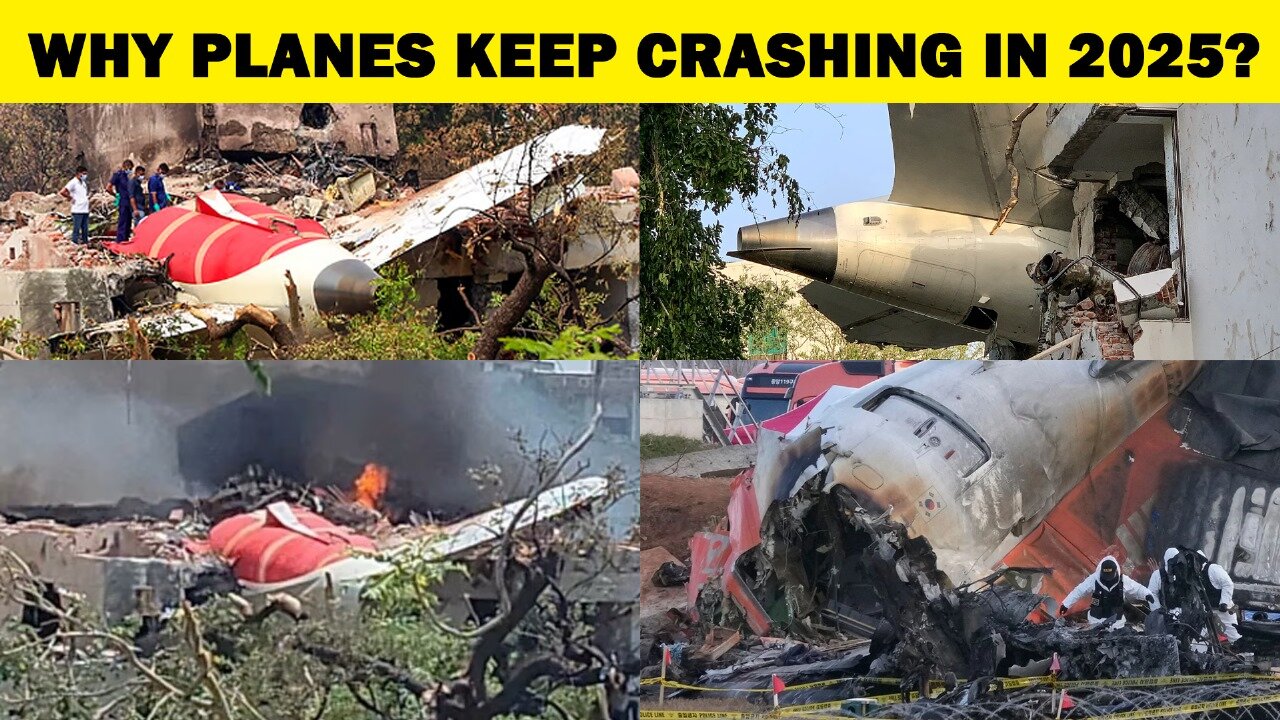Premium Only Content

Why So Many Planes Are Crashing in 2025? | Biggest Plane Crashes Explained | NEWSDRIFT
In 2025, reports of deadly plane crashes are dominating headlines, leaving many travelers wondering if flying is still safe. In this video, we dive deep into the biggest plane crashes of 2025 and uncover the real reasons behind the recent rise in aviation accidents.
From pilot shortages and air traffic control issues to manufacturing concerns at Boeing, we explain the key factors contributing to these tragedies—and why flying is still statistically safer than ever.
Watch till the end to understand the truth behind the alarming crash reports, the data behind aviation safety, and how the industry is responding to ensure safer skies.
Chapters:
0:00 – Intro
0:45 – Why Plane Crashes Feel More Frequent
2:00 – Pilot Experience & Pandemic Impact
3:30 – Air Traffic & System Stress
4:30 – Boeing & Manufacturing Concerns
6:00 – Is Flying Still Safe?
7:00 – The Future of Aviation Safety
#BiggestPlaneCrashes #PlaneCrash2025 #AviationNews #IsFlyingSafe #BoeingCrash #AirlineSafety #Travel2025 #PlaneAccidentsExplained #WhyPlanesCrash
CNN, Fox News, MSNBC, ABC News, NBC News, CBS News, PBS NewsHour, Bloomberg News, CNBC, The New York Times, The Washington Post, NewsNation, Reuters, Associated Press, USA Today
Why are we suddenly hearing about so many plane crashes?
In 2025, headlines have been flooded with tragic news of deadly aviation accidents. From high-profile disasters to unsettling technical malfunctions, it’s no wonder many travelers are asking—what’s going on with the skies? Is flying no longer safe? Or is there more to the story?
Let’s break it down.
So far this year, there have been 14 fatal aviation accidents globally. That number might seem high, especially when some crashes involve large commercial jets. But the truth is, this year isn’t wildly different from most recent years in terms of total accidents per million flights. What’s changed is the visibility and intensity of these crashes.
A string of dramatic and deadly incidents early in the year has created a psychological impact. These stories dominate news cycles, go viral on social media, and trigger real fear in the public. When major incidents happen close together, even if the overall risk hasn’t changed, they feel far more common.
But beyond perception, there are real factors contributing to this uptick.
One of the most significant is pilot experience. During the COVID-19 pandemic, airlines grounded thousands of flights. Veteran pilots took early retirement. Meanwhile, newly trained pilots missed crucial flying hours. As the industry recovered, airlines rushed to get back in the air—but the result was a gap in real-world experience. Many current pilots didn’t get the same hands-on time in the cockpit as their predecessors.
Another issue is air traffic control. The skies are more crowded now than ever, but many control towers are understaffed or stretched thin. With tighter schedules and increasing pressure, the margin for error is smaller.
All these factors—pilot experience, air traffic pressure, and aircraft quality—create a more fragile aviation ecosystem.
But here’s the key point: flying is still extremely safe. According to the International Air Transport Association, the fatality risk has dropped dramatically over the last two decades. In fact, based on 2024 data, a passenger would have to fly every single day for more than 15,000 years to experience a fatal crash.
That’s right—15,000 years.
On average, there is one fatal crash per two million flights. Aviation is far safer than driving, riding a motorcycle, or even walking in some cities. And every incident, no matter how minor or major, is followed by deep investigations and improved regulations to prevent it from happening again.
Still, we can’t ignore the importance of recent events. The biggest plane crashes of 2025 have acted as a wake-up call for the industry. Airlines are now being pushed to improve training, invest in maintenance, and modernize safety systems. Manufacturers are under more pressure than ever to guarantee reliability. And regulators are watching every move.
So yes, we’ve seen more tragic headlines. But those headlines don’t mean we’re facing an aviation crisis. They mean we’re seeing the consequences of a strained system—and the industry now has a chance to respond before things get worse.
In the end, aviation safety is a constant evolution. What matters most is how quickly we adapt.
Thanks for listening. If you found this helpful, don’t forget to subscribe for more in-depth coverage of aviation, tech, and global news. Stay safe and see you next time.
-
 16:30
16:30
Clintonjaws
7 hours ago $2.30 earnedEntire Room Speechless as Pete Hegseth Snaps Destroying All Media To Their Face
12.9K9 -
 22:12
22:12
Dad Saves America
3 hours agoHow Greek Philosophers Created Western Civilization: The Death of Debate - Pt 2
3.28K -
 LIVE
LIVE
LFA TV
20 hours agoLIVE & BREAKING NEWS! | WEDNESDAY 12/03/25
1,164 watching -
 1:05:46
1:05:46
The Quartering
5 hours agoNew Epstein Video Drops! The US Economy Has SCARY Numbers Released & More
116K29 -
 1:07:11
1:07:11
The White House
7 hours agoPresident Trump Makes an Announcement, Dec. 3, 2025
32K19 -
 1:26:28
1:26:28
Film Threat
23 hours agoINSIDE THE DECLINE OF DISNEY! A WARNING FROM THE PAST | Hollywood on the Rocks
14.9K1 -
 1:15:43
1:15:43
DeVory Darkins
5 hours agoDISTURBING: Gavin Newsom makes FATAL MISTAKE after Criminal Illegal Alien kills 11 year old boy
128K88 -
 2:53:35
2:53:35
MattMorseTV
5 hours ago $15.76 earned🔴Trump's HUGE ANNOUNCEMENT.🔴
49.6K57 -
 1:18:21
1:18:21
Sean Unpaved
6 hours agoArch Manning & Texas ELIMINATED From College Football Playoff Contention | UNPAVED
46.6K3 -
 1:59:06
1:59:06
The Charlie Kirk Show
6 hours agoBlackpilled Zoomers + Charlie's Sabbath + Minnesota Meltdown | Bowyer, Turek, Glahn | 12.3.2025
81.1K36